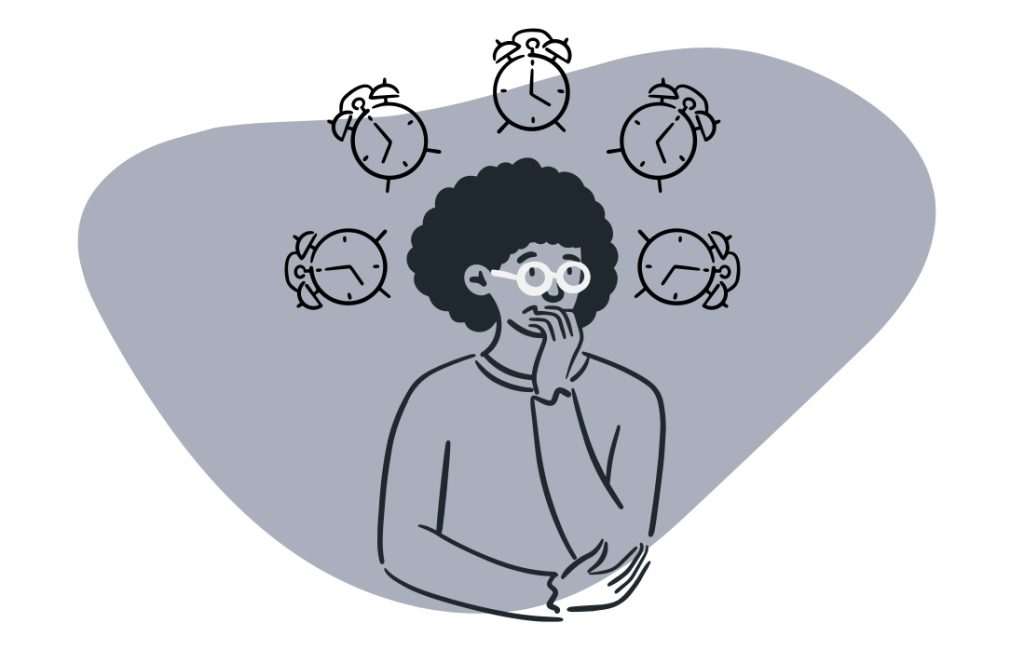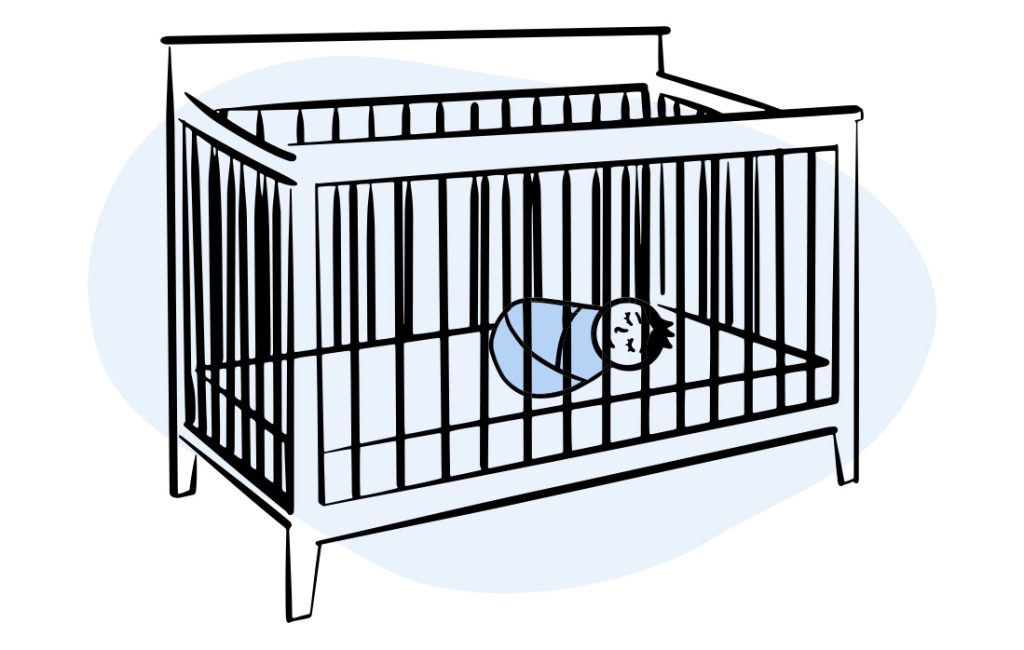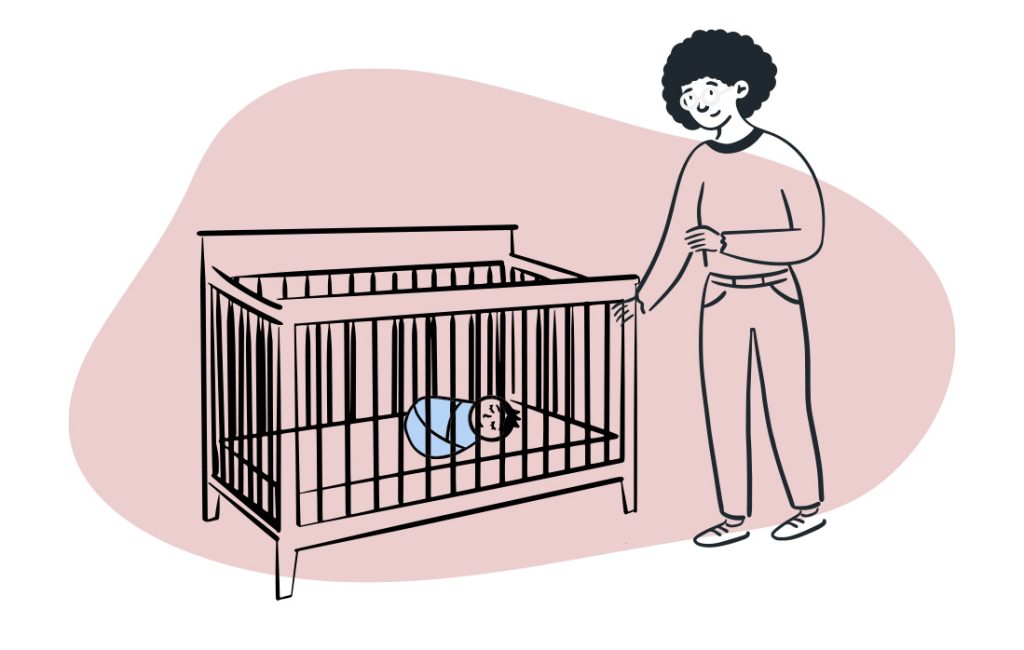Tips To Help Babies Sleep At Night
Disclosure: By clicking on the product links in this article, Mattress Nerd may receive a commission fee at no cost to you, the reader. Read full disclosure statement.
Being a parent to a new baby is a beautiful thing, but it can also be challenging at times. Getting enough sleep (for both you and your baby) is often one of the biggest challenges. Here’s how sleep impacts your little one and our top tips to help your baby sleep through the night.

How Long Should Babies Sleep?
It’s helpful to know how much sleep your child needs. According to the Centers for Disease Control and Prevention (CDC), the required sleep per day depends on the child’s age:
- Birth-3 Months: 14-17 hours
- 4-12 Months: 12-16 hours
- 1-2 Years: 11-14 hours
- 3-5 Years: 10-13 hours
- 6-12 Years: 9-12 hours
- 13-18 Years: 8-10 hours
- 18-60 Years: 7 hours
- 61-64 Years: 7-9 hours
- 65 Years and Older: 7-8 hours
This number of hours includes napping. Our Parent’s Sleep Guide is another great resource for babies and older children.
Too little sleep might negatively impact a child’s brain development, according to recent studies. For example, research suggests that kids with insufficient sleep have less grey matter in their brains. As a result, a sleep deprived child may experience difficulty with the following:
- memory
- attention
- emotions
- impulses
Of course, the amount of time they spend sleeping is important, but getting good quality sleep is also vital to their health. Try to prioritize your own sleep as well to stay healthy for your child.

Expert Tips On How To Get Your Baby To Sleep
Promote a Restful Sleep Environment
Infants are still developing their circadian rhythms. That’s why your child may only sometimes feel tired once it gets dark.
But, recent research found that their rhythms respond to light at ages 8 to 12 weeks. So, it helps to keep your baby’s room or sleep space dark.
Other experts agree. “Dimming the lights in the room where an infant sleeps can increase melatonin levels which promotes sleep onset,” says Dr. Leah Alexander, M.D, FAAP.
Other ways to promote a restful sleep environment include:
- Keep voices down in the evening and night.
- Set playtime during daytime hours only.
- Change their diaper only if needed.
- Turn on white noise or music.
Keep a Bedtime Routine
Humans of all ages are creatures of habit. So, following a consistent bedtime schedule may help. Babies naturally respond to schedules and it helps their sleep rhythm development.
If your baby is still not sleeping at bedtime, you may need to change their nap routine. So, consider moving around their naptimes to promote sleepiness at bedtime.
Play Soothing Lullabies
Do lullabies and music work for babies to fall asleep? The short answer is “yes.”
Music is powerful. It may inspire the emotions of your baby and soothe their mind for sleep. Music should be soft and relaxing to create a calm atmosphere for rest. It can also lower their heart rate while they breathe deeper with the sounds.
You don’t have to be a great singer. Your baby will also love to hear your familiar voice sing to them.
Read to Your Baby
Reading to babies is very beneficial. It doesn’t matter if they can’t understand what you’re reading. The sound of your voice may soothe them, especially when you speak to them with soft tones.
Other benefits of reading include:
- teaching communication and language
- giving babies information about the world around them
- building listening and memory skills
- signaling bedtime and establishes a routine
- helping lull them to sleep
- enhancing bonding
It’s never too early to introduce kids to reading. Of course, they might lose interest, but even a minute or two may make an impact.
Look for Signs They’re Tired
Rocking your baby to sleep is helpful. But you’ll want to lay them in their crib before they’re asleep. Then, they will start to associate falling asleep with their crib.
“Once there are signs of drowsiness, this is the best time to place an infant in the bassinet or crib. Doing so encourages falling asleep in the crib, and without being held,” Dr. Alexander explains.
So, if your baby is showing signs of sleepiness, it’s a good idea to lay them down. They may fuss initially, but give them time to settle down and fall asleep.
“If the baby wakes during the night, it is ok to wait a few minutes instead of immediately going to the baby’s side. This teaches self-soothing,and, over time, can result in fewer sleep disruptions for everyone,” Dr. Alexander adds.
Consider a Pacifier
The American Academy of Pediatrics (AAP) recommends using a pacifier in your baby’s first year. It may reduce your baby’s sudden death syndrome (SIDS) risk. But it may also soothe and help them fall asleep.
If your infant refuses the pacifier, you don’t want to force them to take it. Pacifiers should be cleaned daily and not reinserted into a baby’s mouth once they’re asleep.

What to Avoid When Putting Your Baby to Sleep
You’ll want to avoid any stimulation to your baby. “Parents should avoid using screen devices to play “sleep videos” which can have the opposite effect. White noise has been clinically shown to help lull a baby to sleep such as ocean or rainforest sounds. Alternatively, soft music can have the same calming effect,” states Dr. Alexander.
Other things to avoid are:
- Riding in the car. It may help them fall asleep, but it’s not a good habit or the safest sleeping option. Sleeping buckled in the car seat is never better than sleeping lying flat.
- Adding cereal to the nighttime bottle. A fuller belly doesn’t always prevent the baby from waking up later. Babies should only have breast milk or formula in their bottles.
- Falling asleep while holding your baby. Parents are often exhausted, but it’s important not to fall asleep with your baby in your arms. Place the baby in the crib if you’re too tired. They may cry at first, but can fall asleep safely in their crib soon after.
Helping Babies Sleep FAQs
Why shouldn’t babies sleep on their stomach?
Laying your baby down at night on their back is the safest way for them to sleep. According to research, stomach sleeping increases a child’s risk of SIDS by 1.7-12.9 percent. Sleeping on their belly may obstruct their breathing or cause their body to overheat.
How should babies sleep?
Babies should sleep in a crib or bassinet. Their sleep space should have no stuffed animals, pillows, cushions, or crib bumpers. Instead, a simple receiving blanket and sleeper pajamas should be enough to keep your baby warm.
When do babies start sleeping through the night?
Every baby is unique. Each develops differently and may not sleep as much as others. Typically, babies sleep through the night (6-8 hours) when they are about 3 months old. Reaching a weight of at least 12 pounds may also be a factor.
Final Thoughts
You’ll learn more about your baby’s habits in time. But if they’re not sleeping through the night, please don’t judge yourself. They might have their own natural patterns to consider when setting a bedtime routine. Also, it’s a good idea to speak with your child’s doctor when you have any concerns about their sleep.
Alexander, L. (2023). https://experiencedmommy.com/
Baltagi, I. (2022). How music affects your baby’s brain: Mini parenting master class. https://www.unicef.org/parenting/child-development/how-music-affects-your-babys-brain-class
How much sleep do I need? (2022). https://www.cdc.gov/sleep/about_sleep/how_much_sleep.html
Infant sleep. (2022). https://www.stanfordchildrens.org/en/topic/default?id=infant-sleep-90-P02237
Infant and toddler health. (2022). https://www.mayoclinic.org/healthy-lifestyle/infant-and-toddler-health/in-depth/baby-sleep/art-20045014
Kotz, D. (2022). Children who lack sleep may experience detrimental impact on brain and cognitive development that persists over time, UM School of Medicine study finds. https://www.medschool.umaryland.edu/news/2022/Children-Who-Lack-Sleep-May-Experience-Detrimental-Impact-on-Brain-and-Cognitive-Development-That-Persists-Over-Time-UM-School-of-Medicine-Study-Finds.html
Psaila, K. (2017). Infant pacifiers for reduction in risk of sudden infant death syndrome. https://www.cochranelibrary.com/cdsr/doi/10.1002/14651858.CD011147.pub2/full
Research on back sleeping and SIDS. (2022). https://safetosleep.nichd.nih.gov/research/science/backsleeping
The 6 best ways to make your baby tired (and 3 things not to do). (2022). https://health.clevelandclinic.org/the-6-best-ways-to-make-your-baby-tired-and-3-things-not-to-do/
The benefits of reading to babies. (2020). https://health.clevelandclinic.org/the-benefits-of-reading-to-babies/
Thomas, K. (2017). Light and maternal influence in the entrainment of activity circadian rhythm in infants 4-12 weeks of age. https://www.ncbi.nlm.nih.gov/pmc/articles/PMC4955618/